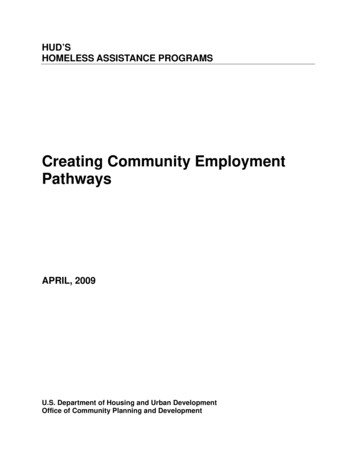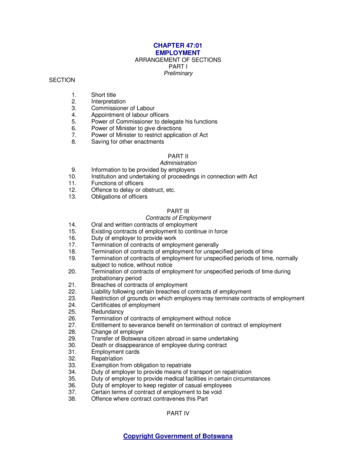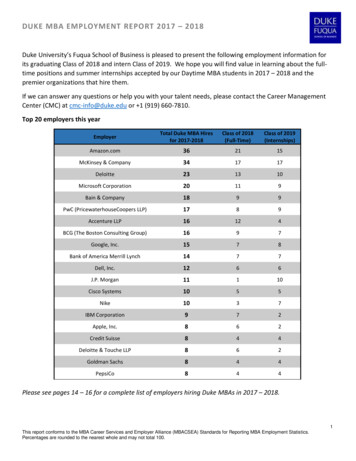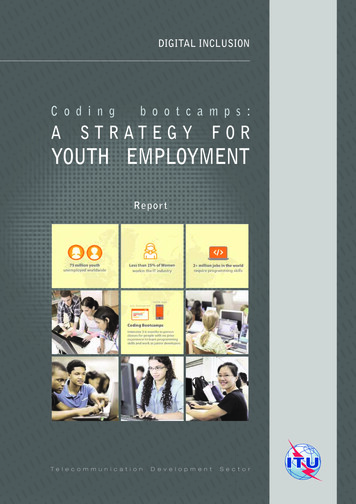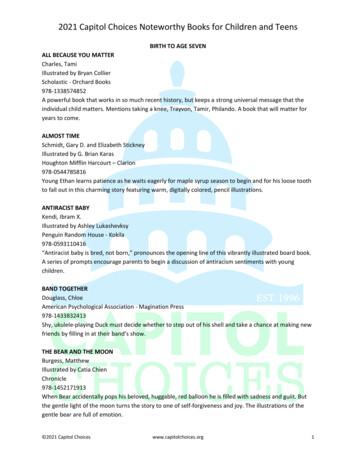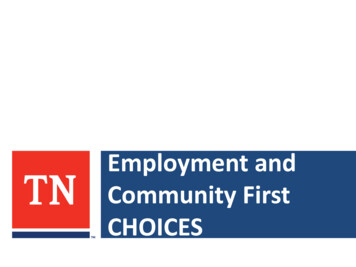
Transcription
Employment andCommunity FirstCHOICES
Background and context Employment and Community First CHOICESOverview– What is it?– Who will it serve?– What will it offer (benefits)?– When will it start?
DD – developmental disabilitiesID – intellectual disabilitiesI/DD – intellectual and developmental disabilitiesDIDD – Department of Intellectual andDevelopmental DisabilitiesECF CHOICES – Employment and Community FirstCHOICESHCBS – home and community based servicesICF/IID – Intermediate Care Facilities for Individualswith Intellectual DisabilitiesLTSS – Long Term Services & Supports
Let’s start with a quick refresher:What is TennCare?What are the TennCare programs for people withintellectual and developmental disabilities?
TennCare is the state’s Medicaid program and the state’sMedicaid agency. Medicaid is a health insurance program to help pay forhealthcare for certain groups of citizens—primarily children,pregnant women, older adults, and people with disabilities.o It is created by the federal government, but administered by thestate. Every state Medicaid program is different.o Medicaid funding is shared by the state and federal government.In Tennessee about 1/3 of the funding is state, and 2/3 is federal.o The federal agency is the Centers for Medicare and MedicaidServices (CMS).
Medicaid provides both medical and non-medical services.The non-medical services are known as “long term servicesand supports” or “LTSS”.Vs.
Medicaid LTSS can be provided In an institution—like a nursing home or Intermediate CareFacility for Individuals with Intellectual Disabilities (ICF/IID) Or in the community—called home and community basedservices or HCBS.
Three Section 1915(c) home and communitybased services (HCBS) waivers for individuals withintellectual disabilitieso Comprehensive Aggregate Capo Statewideo Self-Determination Intermediate Care Facilities for Individuals withIntellectual Disabilities (ICFs/IID)
Currently serve about 9,000 people with intellectualdisabilities in Tennessee’s LTSS programso 1,800 - Comprehensive Aggregate Cap Waivero 4,950 - Statewide Waivero 1,200 - Self-Determination Waivero 1,000 - ICFs/IID (public andprivate)– Currently spend about 936 million (state andfederal funding combined) for Medicaid LTSS forpeople with intellectual disabilities in Tennessee Average cost of providing services to people with IDin TN nearly twice the national average (notsustainable and limits ability to serve more people)
Over 6,000 people with ID on the waiting list for services People with DD do not currently qualify for HCBS waiver services Demand for LTSS (in particular HCBS) is growingo ID waiting listo People with DDo Youth transitioning out of schoolo Aging caregivers 3% of the TennCare population accounts for 50% of program costs(physical health, behavioral health, and LTSS). More than 75% ofpeople with ID receiving LTSS are in that 3% of the TennCarepopulation that accounts for 50% of program costs.
Create a new program that will:o Provide the services people and their families say they needmosto Allow us to provide services more cost-effectivelyo Serve more people, including people on the waiting listand people with other kinds of developmental disabilitieso Align incentives toward employment, independent living,community integration and the things that people withdisabilities and their families value most
Employment and Community First CHOICESis a new program planned to start onJuly 1, 2016.Where did we start?
Where did we start? Stakeholder meetings started late in 2013o March 26, 2014 - Stakeholder Input Summary issued TennCare took the feedback and developed a new “concept”o May 30, 2014 - Concept Paper posted for public commento We asked for public comment on the Concept Paper TennCare incorporated public comment, refined the “concept”paper, and created a proposal for a new program.o Amendment #27 submitted/posted for public comment on June 23,2015 The Centers for Medicare and Medicaid approved the program inFebruary 2016.
Key messages and “themes” from public comment thatshaped our concept and program: People asked for more cost-effective programs that could serve more people People want more independent community living options and help engaging inemployment and activities that are meaningful People suggested more focus on preventive services(not waiting for “crisis”) People and families wanted more education about how to empower themselvesinstead of relying on paid staff and supports People want services that are targeted at young adults coming out of high school People want better coordination between long term services and supports andother aspects of health, like medical services and behavior services People want to have consistent, well trained, quality direct support staff
With Employment and Community FirstCHOICES,Tennessee will becomethe first state in the countryto develop and implement an integrated,home and community based services program,aligning incentives towardpromoting and supporting integrated, competitiveemployment and independent living as the first andpreferred optionfor individuals with intellectualand developmental disabilities
Who is it for? People with intellectual and other developmental disabilities who are notcurrently receiving serviceso People with ID on a waiting list for HCBS waivers( 6,000; 4,000 actively waiting; 2,000 deferred)o People with DD not eligible for current HCBS programs (estimate 3,00010,500, based on prevalence and utilization data)o Upon implementation, all new HCBS enrollment will be directed toEmployment and Community First CHOICES It will take time to be able to serve all of the people who need support. Initial enrollment will target groups identified by stakeholders:o People with aging caregiverso Young adults transitioning from school and other people who needemployment supports People in current waivers are not impacted, but can choose to move to the newprogram later on
What will it offer? Benefits that people with I/DD and their families say theyneed most Support for families caring for a person with I/DD Supports to help people with I/DD achieve employmentand independent living goals For people who choose not to work or need moresupport to live in the community - residential and otherday services to help them achieve their community livinggoals Includes consumer direction options
Three benefit groups: Essential Family Supports Essential Supports for Employment and Independent Living Comprehensive Supports for Employment and CommunityLiving
Essential Family Supportso Supports for families caring for a person—primarily children age 21, living at home with their families– HCBS beyond scope of EPSDT (comprehensive Medicaid benefits forchildren) that will help support families and sustain naturalcaregiving networkso Adults age 21 and older living at home with family caregivers mayalso elect to enroll in this groupo Help plan and prepare for transition into employment andintegrated, independent living in adulthoodo Hope to serve up to 500 individuals in this group inyear 1, depending on the funding approved by the GeneralAssembly
Essential Supports for Employment and IndependentLivingo Adults age 21 and older with ID or DDo Without HCBS, “at risk” of institutionalization(have a lesser level of need)o Helping adults plan for and achieve employment andindependent living goals, experience community lifeo Assisting young adults to transition from school into integrated,competitive employmento Hope to serve up to 1,000 individuals in this group in year 1,depending on the funding approved by the General Assembly
Comprehensive Supports for Employment and CommunityLivingo For adults age 21 and older with I/DD who need more support tohelp them achieve employment and community living goalso Meet nursing facility level of care and require specializedsupports related to I/DD (more significant needs)o More intensive level of services/supportso Help adults plan and achieve employment and community livinggoals, become as independent as possible, participate fully incommunity lifeo Hope to serve up to 200 individuals in this group inyear 1, depending on the funding approved by the GeneralAssembly
14 employment services and supports Designed in consultation with experts from the federal Office on DisabilityEmployment Policy Create a “pathway” to employment, even for individuals with significantdisabilities Outcome or value-based reimbursement and other strategies to alignincentives toward employment Wrap around services to support community integration No facility based services Many new services, based on stakeholder input, that will empowerindividuals and families toward independence and integration Supports, including 24 hour residential services (when appropriate), up tothe same level as available under the current Statewide waiver (for peoplewith ID), but benefits are targeted based on need
What, exactly, are the services thatwill be available?
14 different Employment Services/Supports1. Exploration2. Discovery3. Situational Observation and Assessment4. Job Dev Plan5. Self Employment Plan6. Job Dev Start Up7. Self-Employment Start Up8. Job Coaching for Individual Integrated Employment9. Job Coaching for Self-Employment10. Co-Worker Supports11. Supported Employment – Small Group12. Career Advancement13. Benefits Counseling14. Integrated Employment Path Services (Pre-Vocational)Plus employment wrap-around services like: Independent Living Skills Training Community Integration Support Services Community Transportation* Not all services are available in every benefit package.Other LTSS RespitePersonal AssistanceSupportive Home Care (SHC)Family Caregiver Stipend (in lieu of SHC)Community Living SupportsCommunity Living Supports-Family ModelAssistive Technology, Adaptive Equipment and SuppliesMinor Home ModificationsSpecialized Consultation and TrainingAdult Dental ServicesAnd self-advocacy supportsIndividual Education and TrainingFamily Caregiver Education and TrainingFamily-to-Family SupportPeer-to-Peer Person-Centered Planning, Self-Direction,Employment, and Community Support and NavigationCommunity Support Development, Organization andNavigationConservatorship and Alternatives to ConservatorshipCounseling and AssistanceHealth Insurance Counseling/Forms Assistance (TDCI)
Essential Family Supportso 15,000, not counting the cost of minor home modifications; consistent withCHOICES 3 Essential Supports for Employment and Independent Livingo 30,000o Exception for emergency needs up to 6,000 per year(hard cap of 36,000); consistent with Self-Determination Waiver Comprehensive Supports for Employment and Community Livingo 45,000 for low to moderate needo 60,000 for high needo Exception Up to applicable average cost of NF specialized services for DD withexceptional medical/behavioral needs Up to average cost of private ICF/IID for ID with exceptional medical/behavioralneedso Level of need, including exceptional medical/behavioral needs, to be determinedthrough use of the Supports Intensity Scale (designed specifically for people withI/DD), administered by an objective entity
What else do I need to know? The new program will be different from the current waivers because it will beoperated by TennCare health plans (“Managed Care Organizations” or “MCOs”).o Managed Care helps us achieve one of the things stakeholders recommended:making sure your LTSS are coordinated with other services, like medical andbehavioral services.o It also helps us align incentives (like payment for services) in ways that help peopleachieve their goals. Instead of an Independent Support Coordinator or Case Manager, peoplereceiving services will have a “Support Coordinator” who works with you todevelop your Person-Centered Support Plan that will include:ooooIndividually identified employment, community living, and health and wellness goalsPhysical and behavioral health services and LTSS you needNatural and social supportsYour choices and preferences with respect to services, settings and delivery options DIDD will help people who aren’t Medicaid eligible apply for and enroll in thenew program, and will help with quality oversight and critical incidentmanagement.
When will it be implemented? CMS approval received February 2016 Next step is approval by the General Assembly of fundingto provide these new services Implementation activities are underway in anticipation ofa planned July 1, 2016 go-live date
?
Jul 01, 2016 · CHOICES 3 Essential Supports for Employment and Independent Living o 30,000 o Exception for emergency needs up to 6,000 per year (hard cap of 36,000); consistent with Self-Determination Waiver Comprehensive Supports for Employment and Community Living o 45,000 for

